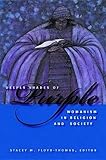Deeper Shades of Purple : Womanism in Religion and Society / ed. by Stacey M. Floyd-Thomas.
Material type: TextSeries: Religion, Race, and Ethnicity ; 13Publisher: New York, NY : New York University Press, [2006]Copyright date: ©2006Description: 1 online resourceContent type:
TextSeries: Religion, Race, and Ethnicity ; 13Publisher: New York, NY : New York University Press, [2006]Copyright date: ©2006Description: 1 online resourceContent type: - 9780814727522
- 9780814728659
- 230.082 22/eng/20231120
- BT83.9 .D44 2006
- online - DeGruyter
| Item type | Current library | Call number | URL | Status | Notes | Barcode | |
|---|---|---|---|---|---|---|---|
 eBook
eBook
|
Biblioteca "Angelicum" Pont. Univ. S.Tommaso d'Aquino Nuvola online | online - DeGruyter (Browse shelf(Opens below)) | Online access | Not for loan (Accesso limitato) | Accesso per gli utenti autorizzati / Access for authorized users | (dgr)9780814728659 |
Frontmatter -- Contents -- Acknowledgments -- Wisdom Rocked Steady -- Introduction: Writing for Our Lives—Womanism as an Epistemological Revolution -- Part I. Radical Subjectivity -- Radical Subjectivity -- When Mama Was God -- 1. Structured Academic Amnesia: As If This True Womanist Story Never Happened -- 2. From “Force-Ripe” to “Womanish/ist”: Black Girlhood and African Diasporan Feminist Consciousness -- 3. Womanism Encounters Islam: A Muslim Scholar Considers the Efficacy of a Method Rooted in the Academy and the Church -- 4. Standing in the Shoes My Mother Made: The Making of a Catholic Womanist Theologian -- Part II. Traditional Communalism -- Traditional Communalism -- ReflectingBlack -- 5. Dancing Limbo: Black Passages through the Boundaries of Place, Race, Class, and Religion -- 6. Hospitality, Haints, and Healing: A Southern African American Meaning of Religion -- 7. Lessons and Treasures in Our Mothers’Witness: Why I Write about Black Women’s Activism -- 8. “Mama Why . . . ?”A Womanist Epistemology of Hope -- Part III. Redemptive Self-Love -- Redemptive Self-Love -- I’ve Been Mixed Like Cornbread -- 9. Twenty Years a Womanist: An Affirming Challenge -- 10. A Womanist Journey -- 11. Quilting Relations with Creation: Overcoming, Going Through, and Not Being Stuck -- 12. The Sweet Fire of Honey:Womanist Visions of Osun as a Methodology of Emancipation -- Part IV. Critical Engagement -- Critical Engagement -- Nevertheless, in Stark Contradiction -- 13. Womanist Humanism: A New Hermeneutic -- 14. A Thinking Margin: The Womanist Movement as Critical Cognitive Praxis -- 15. The Womanist Dancing Mind: Speaking to the Expansiveness of Womanist Discourse -- Part V. Appropriation and Reciprocity -- Appropriation and Reciprocity -- they came because of the wailing -- 16. Womanist Visions,Womanist Spirit: An Asian Feminist’s Response -- 17 Lavender Celebrates Purple: A White Feminist Response -- 18. Womanists and Mujeristas, Sisters in the Struggle: A Mujerista Response -- 19. Mining the Motherlode: A Latina Response -- 20. What’s the Theological Equivalent of a “Mannish Boy”? Learning a Lesson from Womanist Scholarship— A Humanist and Black Theologian Response -- 21. Lies above Suspicion: Being Human in Black Folk Tales— A Black Liberation Theologian Response -- 22. Is a Womanist a Black Feminist? Marking the Distinctions and Defying Them: A Black Feminist Response -- Selected Womanist Bibliography -- About the Contributors -- Index
restricted access online access with authorization star
http://purl.org/coar/access_right/c_16ec
Womanist approaches to the study of religion and society have contributed much to our understanding of Black religious life, activism, and women's liberation. Deeper Shades of Purple explores the achievements of this movement over the past two decades and evaluates some of the leading voices and different perspectives within this burgeoning field.Deeper Shades of Purple brings together a who's who of scholars in the study of Black women and religion who view their scholarship through a womanist critical lens. The contributors revisit Alice Walker's definition of womanism for its viability for the approaches to discourses in religion of Black women scholars. Whereas Walker has defined what it means to be womanist, these contributors define what it means to practice womanism, and illuminate how womanism has been used as a vantage point for the theoretical orientations and methodological approaches of Black women scholar-activists.Contributors: Karen Baker-Fletcher, Katie G. Cannon, M. Shawn Copeland, Kelly Brown Douglas, Carol B. Duncan, Stacey M. Floyd-Thomas, Rachel Elizabeth Harding, Rosemarie Freeney Harding, Melanie L. Harris, Diana L. Hayes, Dwight N. Hopkins, Ada María Isasi-Díaz, Cheryl A. Kirk-Duggan, Kwok Pui-Lan, Daisy L. Machado, Debra Majeed, Anthony B. Pinn, Rosetta Ross, Letty M. Russell, Shani Settles, Dianne M. Stewart, Raedorah Stewart-Dodd, Emilie M. Townes, Traci C. West, and Nancy Lynne Westfield.
Mode of access: Internet via World Wide Web.
In English.
Description based on online resource; title from PDF title page (publisher's Web site, viewed 06. Mrz 2024)


